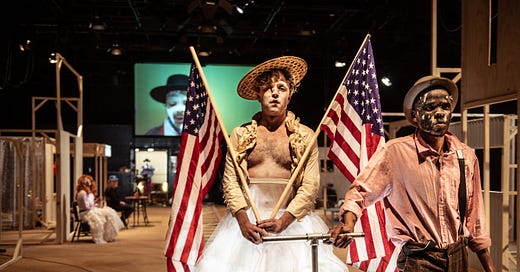Spoleto Review: At turns amiable then bracing, 'Dark Noon' mines how the West was spun
The Denmark-based Fix+Foxy casts an alternately cold and comedic eye on Manifest Destiny
With their mano-a-mano gun-slinging showdowns, gold-crazed miners, bonneted prairie womenfolk and terrible take on Indigenous people, the tried-and-true tropes of the American West were for a good long stretch the regular stuff of celluloid films.
Think of a badge-clad John Wayne exacting hard-won justice on some dastardly menace or a steely-eyed Clint Eastwood taking matters into his own unflinching hands.
It wasn’t only the sprawling sets and marquee actors that helped Hollywood shape a mythology of Manifest Destiny in the good ole USA. Moviegoers the world over, and as far away as South Africa, also regularly ingested that same rousing refrain as they marveled over America’s bold new frontier.
But in Dark Noon, as we race through one chapter of American history after the next, we begin to glean that it’s not all guns and roses. The bold new frontier does mighty strange things to a fella.
First, there’s the matter of whose lens is on the makeshift film being produced on stage in this work by Denmark-based Fix+Foxy in its U.S. premiere at Spoleto. Written and directed by Tue Biering, and co-directed and choreographed by Nhlanhla Mahlangu, this is by no means a homespun take on the West, but one from the vantage of those viewing it from elsewhere.
The company has enlisted seven South African actors, who powder their faces white and don blonde wigs in order to portray the likes of settlers and cowboys, sheriffs and prospectors, while also portraying the Indigenous people who railed against this new notion of land ownership and the toiling Chinese immigrants laying down the railroad one rail at a time.
Over the course of nearly two hours, we chart the rise and arguably ruin of American Western civilization as it devolves into something craven and chilling, panning out on American history, too. As we do, a bare stage of Festival Hall is gradually settled, too, first with a few boards and spare walls to finally become a proper storied town, complete with a railroad and prison cell. All the while, characters perform cameos in an onstage camera with the screen projected in real time.
It starts out convivially enough, with bright-eyed, smiling performers sharing snippets of the gleaming optimism that prompted settlers from across the country and the pond to head for these gold-bedazzled hills and free land for the taking. Dark Noon begins by beguiling, engaging audience members in bit parts and delighting in its subject matter.
Soon enough, chapter by chapter, the cracks in the previously established narrative deepen like a parched stretch of desert. We get a sense of just what was being imported by these settlers — the disease and the weapons — and the brutality with which those were aimed at the Indigenous people.
We bear witness for a painful protraction of minutes to the repeated shooting of a Native American who rises repeatedly. We see the spin of Europeans as they write comforting, vital lies to family back in Europe. We get the skinny on the rampant fornication and prostitution that brought many a strange bedfellow together for stolen moments of escape.
The camera captures an unwitting audience member enlisted by an actor. She sits in agonizing silence in the glare of its accusing frame. Others are ushered up and hectored — or corralled onto stage to be sold on an imagined auction block, as one by one they stand mutely before all as their worth is assessed.
What begins with a wink and a nod ends as a gutting. The bright shiny object — be it land ownership, get-rich-quick gold or a game-changing railroad — that sparkled with all of its can-do optimism darkens with the work’s every successive chapter. Settling in the American West has morphed into something wholly unsettling.
Just as those early settlers were cajoled to go West, we have been, too, by these engaging, beaming performers who theatrically kiss before killing. At the end of the work the performers then reveal their own entree to the genre in South Africa, a telling theatrical foil with its own fraught history.
What this unflinching, ambitious work underscored was this: In any society settled through dominance or oppression, high noon is high time to step 20 paces, turn around, and take aim at false narratives. With deceptive conviviality, Dark Noon is dead-on as it blasts those narratives away.
There are remaining performances today, with tickets available at spoletousa.org. But if you miss it at Spoleto, you have ample chance to see it up in Brooklyn at the perennially phenomenal St. Ann’s Warehouse, where it will run from June 8 through July 7.






